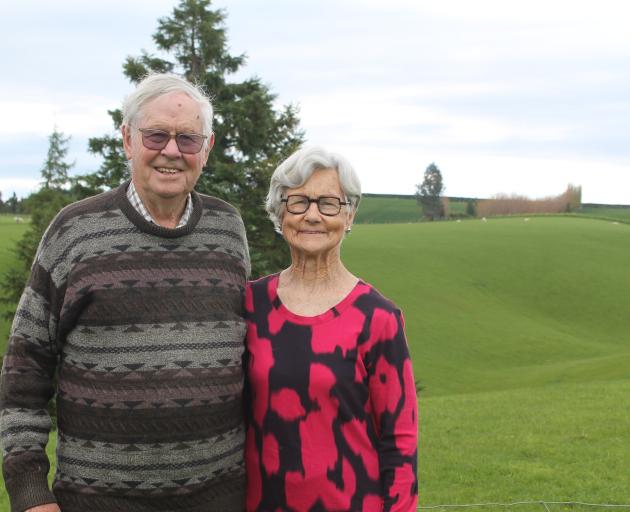Lifestyle
Family Farms in New Zealand Face Sale as Generations Change

The sale of several long-established family farms in New Zealand highlights a significant shift in agricultural traditions as owners grapple with the challenge of finding suitable successors. These farms, some of which have been in operation for over a century, are now on the market due to changing family dynamics and economic pressures.
David and Elizabeth Smith’s Wendon Valley farm in Waikaka, which has been in Mr. Smith’s family since 1885, was listed for sale at the end of September. Similarly, Bill and Pam McCall’s Viewfield Farm in Waikoikoi has been in their family for an impressive 113 years. Just a week later, Allan and Noeline Smith’s Bracken Hill, located five minutes northeast of Gore, also went up for sale, marking its 150th year under the Smith name.
Challenges of Succession and Industry Pressures
Noeline Smith, who has farmed Bracken Hill for over 60 years, expressed the bittersweet nature of the decision to sell. Both she and her husband, now in their 80s, face the reality that no family member is ideally suited to take over the farm. “We don’t have a family member that’s ideally suited to take it over and that is a very sad thing for us,” she stated in an interview with the Otago Daily Times.
The couple’s decision is influenced by the challenges facing the sheep industry, which Noeline Smith cited as a reason for their children’s disinterest in farming. “We all love sheep, but you still have to have money, don’t you, to run a farm?” she said, highlighting the financial burdens of modern agriculture.
Elizabeth Smith, also from Waikaka, shared a similar sentiment. Despite having five daughters, she noted that even a son might not have wanted to continue the farming legacy. In their 60s, she and her husband are eager to transition into retirement, seeking opportunities to travel and spend time with grandchildren. “It would be hard for us to say goodbye to our 299ha property,” she reflected, acknowledging the emotional weight of their impending sale.
As these families prepare to part with their farms, questions arise about the broader implications for rural communities and agricultural practices. Peter Gardyne, who has leased Bracken Hill since Allan Smith’s heart attack nearly five years ago, remarked on the improved market conditions compared to a couple of years ago, suggesting it is a favorable time for such sales.
Impacts on Rural Communities
The trend of selling longstanding family farms may indicate a shift in the agricultural landscape of New Zealand. While some owners express hope for new buyers, the emotional toll of giving up family traditions cannot be underestimated. As these farms change hands, the future of family-run agriculture hangs in the balance, raising concerns about the preservation of local farming culture.
As the Smiths and McCalls navigate this transition, they reflect on the legacy of their farms while also acknowledging the realities of modern agricultural challenges. The decision to sell is not only about property but also about the changing face of farming in New Zealand, as generational values and economic viability continue to evolve.
-

 World3 months ago
World3 months agoTest Your Knowledge: Take the Herald’s Afternoon Quiz Today
-

 Sports3 months ago
Sports3 months agoPM Faces Backlash from Fans During Netball Trophy Ceremony
-

 Lifestyle3 months ago
Lifestyle3 months agoDunedin Designers Win Top Award at Hokonui Fashion Event
-

 Sports3 months ago
Sports3 months agoLiam Lawson Launches New Era for Racing Bulls with Strong Start
-

 Lifestyle3 months ago
Lifestyle3 months agoDisney Fan Reveals Dress Code Tips for Park Visitors
-

 World3 months ago
World3 months agoCoalition Forms to Preserve Māori Wards in Hawke’s Bay
-

 Health3 months ago
Health3 months agoWalking Faster Offers Major Health Benefits for Older Adults
-

 Politics3 months ago
Politics3 months agoScots Rally with Humor and Music to Protest Trump’s Visit
-

 Top Stories3 months ago
Top Stories3 months agoUK and India Finalize Trade Deal to Boost Economic Ties
-

 Entertainment3 months ago
Entertainment3 months agoExperience the Excitement of ‘Chief of War’ in Oʻahu
-

 World3 months ago
World3 months agoHuntly Begins Water Pipe Flushing to Resolve Brown Water Issue
-

 Science3 months ago
Science3 months agoNew Interactive Map Reveals Wairarapa Valley’s Geological Secrets









